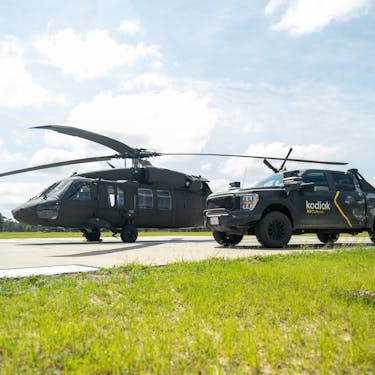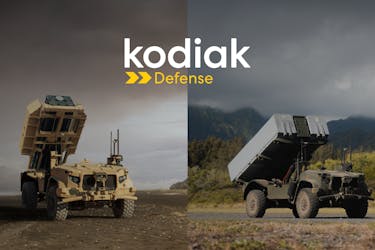Kodiak AI Appoints Retired Marine Corps Four-Star General and Navy Three-Star Vice Admiral to Defense Advisory Council

- Retired Marine Corps General Frank McKenzie and Retired Navy Vice Admiral Michael Moran Join Chairman, Retired Army Lieutenant General Richard “Ross” Coffman, on Kodiak’s Defense Advisory Council
- The Council helps guide the deployment of Kodiak’s autonomous vehicle technology in defense markets
MOUNTAIN VIEW, Calif. — Kodiak AI, Inc. (“Kodiak”), a leading provider of AI-powered autonomous vehicle technology, today announced that retired U.S. Marine Corps General Frank McKenzie and retired U.S. Navy Vice Admiral Michael Moran have joined its recently established Defense Advisory Council (the “Council”). The Council is led by Kodiak’s strategic advisor, retired U.S. Army Lieutenant General Richard “Ross” Coffman. The Council is designed to help shape Kodiak’s strategy and deployment of its technology with the U.S. Department of Defense and the broader public sector.
The Council is currently composed of retired senior officers from the United States Armed Forces. The new members bring diverse military experience that Kodiak believes will help guide the company’s continued efforts to serve its defense customers.
“Our Defense Advisory Council provides critical insights into how we can leverage our AI-powered AV technology for defense and public sector applications,” said Don Burnette, Founder and CEO, Kodiak AI. "Gen. McKenzie brings valuable national security expertise that we believe will help advise us on how best to provide value to servicemembers on the front lines and those supporting from behind in logistics roles. Vice Adm. Moran’s substantial experience in technology acquisition for the Department of Defense helps bolster us with operational knowledge that we believe will help us grow our public sector business. A special thank you to our investor Marlinspike for introducing us to these fantastic advisors."

Richard "Ross" Coffman
Ret. Army Lt. Gen.
Chair
Retired United States Marine Corps General Frank McKenzie
Gen. McKenzie brings deep national security experience, including strategy, diplomacy, and leadership of large-scale combat operations to the Council. As a Lieutenant General, He was the Commanding General of U.S. Marine Corps Forces Central Command, and as a General he subsequently served as the Commander U.S. Central Command. His leadership experience includes his prior service on the Joint Staff as the Director for Strategic Plans and Policy (J-5), and then as the Director of the Joint Staff. Earlier in his career, he commanded at the platoon, company, battalion, Marine Expeditionary Unit (MEU), and component levels. He led the 22d MEU(SOC) on combat deployments to Afghanistan and Iraq. As a lieutenant colonel, he commanded First Battalion, Sixth Marines. He also served as the Military Secretary to the 33rd and 34th Commandants of the Marine Corps. He retired from active duty in April 2022.
Gen. McKenzie is currently the Executive Director of the Global and National Security Institute and the Florida Center for Cybersecurity at the University of South Florida. He is also President of the Board of Directors of the Institute of Applied Engineering at the University of South Florida; a Distinguished Military Fellow at the Middle East Institute; a Member of the International Advisory Committee of the National Council on U.S.-Arab Relations, and a Member of the National Security Advisory Council, U.S. Global Leadership Coalition. Additionally, Gen. McKenzie is the Hertog Distinguished Fellow at the Jewish Institute for the National Security of America (JINSA).
Retired United States Navy Vice Admiral Michael Moran
Vice Admiral Moran is a Department of Defense acquisition expert. He retired from the U.S. Navy in 2021 after 38 years, last serving as Principle Military Deputy for the Assistant Secretary of the Navy for Research, Development & Acquisition. Earlier, he served as military assistant to the Undersecretary of Defense for Acquisition, Technology and Logistics. He previously served as program executive officer for the Navy’s Tactical Aircraft Program Executive Office (PEO-T), overseeing full life-cycle support of naval aviation tactical and training aircraft, shipboard support systems, air-to-air weapons and sensors. Vice Adm. Moran commanded the Naval Air Warfare Center Weapons Division, Naval Air Weapons Station China Lake, California, and was assistant commander for test and evaluation for Naval Air Systems Command (NAVAIR). Earlier, he served as Project Officer for operational program and NAVAIR tours. This included serving as Program Manager of the Navy’s Maritime Patrol and Reconnaissance Aircraft Program Office, which oversees the P-3C Orion and P-8A Poseidon. Vice Adm. Moran retired from the Boeing Company in 2024 as the Vice President for Next Generation Product Support.
LTG. Coffman, who serves as the founding chairman of the Kodiak Defense Advisory Council, served as Deputy Commanding General of the United States Army Futures Command (AFC), AFC’s second-highest-ranking officer. In that role, he oversaw the modernization of the U.S. Army with an emphasis on ground robotics. Earlier, he was Director of AFC’s Next Generation Combat Vehicle Cross-Functional Team, where he stood up the Army’s ground autonomy initiatives. Prior to that, he served as the Deputy Commanding General for Maneuver in the 1st Infantry Division, where he assisted with assessing and integrating next generation technologies to combat emerging threats.
Forward-Looking Statements
This press release includes forward-looking statements relating to Kodiak’s expectations, hopes, beliefs, intentions or strategies regarding the future. Forward-looking statements may be identified by the use of words such as “anticipate,” “believe,” “continue,” “could,” “estimate,” “expect,” “forecast,” “intend,” “may,” “plan,” “potential,” “project,” “seek,” “should,” “will,” “would” and similar expressions that predict or indicate future events or trends or that are not statements of historical matters, but the absence of these words does not mean that a statement is not forward-looking. These forward-looking statements include, but are not limited to, statements regarding the expected impact from the appointment of the new members to the Council. These statements are based on various assumptions and on the current expectations of Kodiak’s management, as applicable, and are not predictions of actual performance. These forward-looking statements are subject to a number of risks and uncertainties, including changes in business, market, financial, political and legal conditions; the rapid evolution of autonomous vehicle technology and flaws or errors in Kodiak's solutions or flaws in or misuse of autonomous vehicle technology in general; risks related to the rollout of Kodiak’s business and timing of expected business milestones; the effects of competition; supply shortages in the materials necessary for the production of Kodiak’s products; risks related to working with third-party manufacturers for key components of the Kodiak’s products; risks related to the retrofitting of Kodiak’s vehicles by third parties; and the termination or suspension of any of Kodiak’s contracts or the reduction in counterparty spending; and delays in Kodiak’s operational roadmap with key partners and customers. If any of these risks materialize or any assumptions prove incorrect, actual results could differ materially from the results implied by these forward-looking statements. There may be additional risks that Kodiak does not presently know or that Kodiak currently believes are immaterial that could also cause actual results to differ from those contained in the forward-looking statements. These forward-looking statements are provided for illustrative purposes only and are not intended to serve as and must not be relied on by investors as a guarantee, an assurance, a prediction or a definitive statement of fact or probability.
About Kodiak AI, Inc.
Kodiak AI, Inc. was founded in 2018 and is a leading provider of AI-powered autonomous vehicle technology that is designed to help tackle some of the toughest driving jobs. Kodiak’s driverless solution can help address the critical problem of safely transporting goods in the face of unprecedented supply chain challenges. Kodiak’s vision is to become the trusted world leader in autonomous ground transportation. Kodiak is committed to a safer and more efficient future for all through the commercialization of driverless trucking at scale. To that end, Kodiak developed the Kodiak Driver, a virtual driver that combines advanced AI-powered software with modular and vehicle-agnostic hardware designed to help address Kodiak’s customers’ needs. The Kodiak Driver is not just an idea—it is operating without a human driver today. Kodiak serves customers in both commercial trucking and the public sector. In 2024, Kodiak believes it achieved a historic milestone by becoming the first company to deploy customer-owned and -operated driverless trucks in commercial service. The Kodiak Driver is also being utilized in the public sector, where Kodiak believes it can support national security initiatives and critical government applications.

